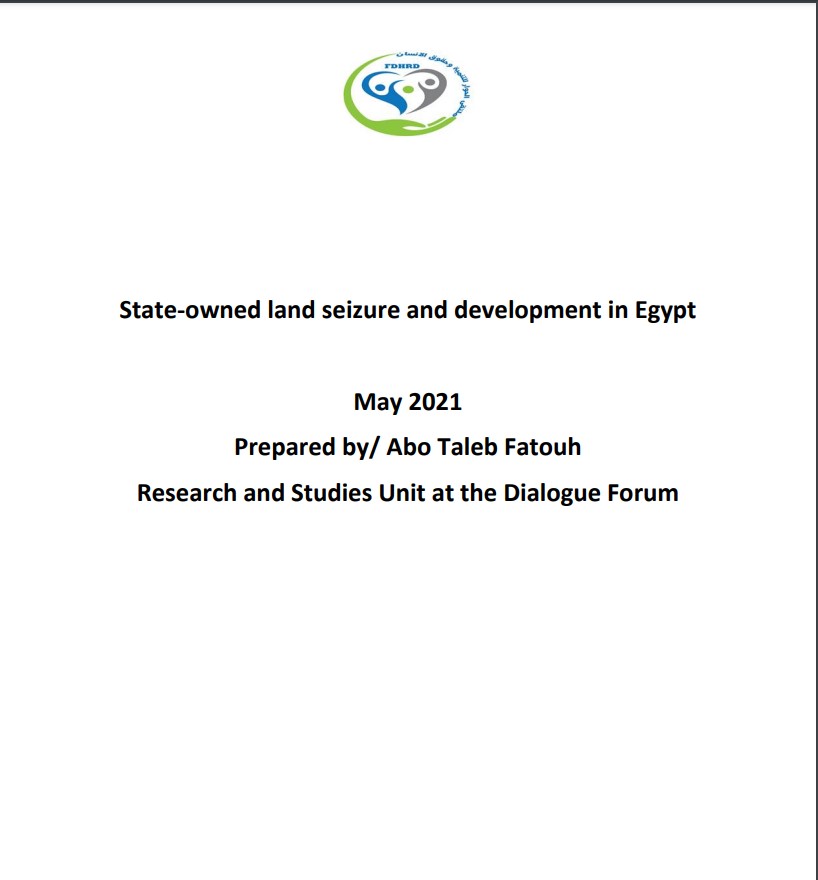Saturday, May 1, 2021
Press Release
————————————————————
On Saturday, May 1, 2021, the Research and Studies Unit of the Dialogue Forum for Development and Human Rights issued a report on “The Seizure of State-Owned Land and Development in Egypt”
The report stressed that improving the management of the state’s land contributes directly to achieving the sustainable development goals in its three dimensions and therefore deserves to be at the top of the agenda of national priorities, and also stressed that improving the system of management of the state land has become an urgent necessity in light of the future and current challenges facing Egypt and perhaps the doubling of the population over the next forty years and the required provision of all the elements of life one of the most important of these challenges besides the current challenges, including High poverty rates, uneven levels of regional development, high unemployment, urban sprawl, erosion of agricultural area, pressure on services and facilities, as well as relative scarcity of key resources, most notably water.
The report explained that despite the many efforts of various governments to maximize the use of state land, most notably the issuance of legislation governing the management and allocation of land and the establishment of the National Center for Planning the Use of State Land, the land management system in Egypt continues to suffer from many forms of imbalances resulting from the absence of a clear national vision that reflects the strategic objectives of the state in managing its territory and determining its uses from a comprehensive development perspective in addition to the lack of a mechanism to follow up and evaluate the performance of Those responsible for managing and using the state’s land, lacking transparency, objectivity, accountability and distance from the good governance of one of the most important state-owned assets.
The report noted that imbalances have led to access to land becoming one of the most prominent obstacles to domestic and foreign investment within Egypt, so Egypt’s repeated announcement of investment promotion and many incentives will not pay off on the ground without providing land at affordable prices and easy procedures.
The report also stressed that the preservation of state property is a national duty that requires concerted efforts and coordination between all state agencies and institutions in order to take advantage of this great wealth by creating the appropriate legal environment and strengthening all relevant agencies to facilitate their mission in tracking down criminals, who abuse and seize state property.
With regard to the reasons for the seizure of State territory, the report stated that the absence of the law was one of the most important reasons for the seizure of State land. Laws and legislation governing the management, exploitation and disposal of State territory had accumulated over the past decades and had exceeded 50 between republican laws and decisions or a Cabinet decisions, most of which were outdated and did not reflect local or international developments in the management of public lands. In addition to the fact that most of these laws were inconsistent and conflicting, a direct result of the multiplicity of state land management and use.
The report also stated that the issue of deeply rooted local corruption is also one of the most important reasons for the seizure of state land.
With regard to the presidency and the restoration of state land, the report explained that since2011, 2 million violations have been recorded on 90,000 fedans, and the President issued resolution 75 of 2016, forming a committee headed by Engineer Ibrahim Mahaleb, which is responsible for registering all land found to be illegally seized and to recover the land by legal means, in addition to limiting all debts owed to state authorities on the land and classifying debtors with these dues.
Regarding the crisis of Egypt’s northern lakes, the report pointed out that Egypt has 14 lakes and these lakes represent a great economic importance, where their fish production amounts to more than 75% of the total production in Egypt, but because of the revolutions and chaos that the country has gone through, Egyptian lakes have been neglected and have become landfills or platforms for the disposal of waste factories as well as violations due to overfishing.
The report explained that Lake Meriut and the surrounding area have become a symbol of encroachments on the territory of the state and the Lake Al-Manzala comes as one of the most important northern lakes in the Mediterranean on the list of lakes at risk as it faces various challenges of drying and pollution and the Ministry of Water Resources has carried out the development of The House Lake in two phases with an initial value of 305 million pounds.
According to the report regarding the areas returned by the state, Egypt’s provinces have succeeded in implementing nearly 4,000 cases of removal of encroachments.
The percentage of slums in Cairo, Giza, Alexandria,Al-Sharqia and Qalyubia governorates amounted to 40% of the land in Egypt.
There are also 1.9 million cases of violations on agricultural land from 2011 to 2018. 3 million and 240,000 properties are the number of building violations in all provinces and 9,609 building violations within the urban space and 20,447 violations of building on agricultural land.
The report also showed that 12,641 cases were referred to the military prosecutor’s office between March 25 and August 17, 2019.
Some 8,300 cases of abuse have been removed, including some 4,721 encroachments on construction land of more than four million square meters, 3,550 encroachments on agricultural land of about 34,000 acres.
The area of land recovered in 2019 amounted to about 3 million and 569 thousand square meters and the removal of 5,213 cases of encroachment on agricultural land amounting to an area of about 193,000 acres recovered.








